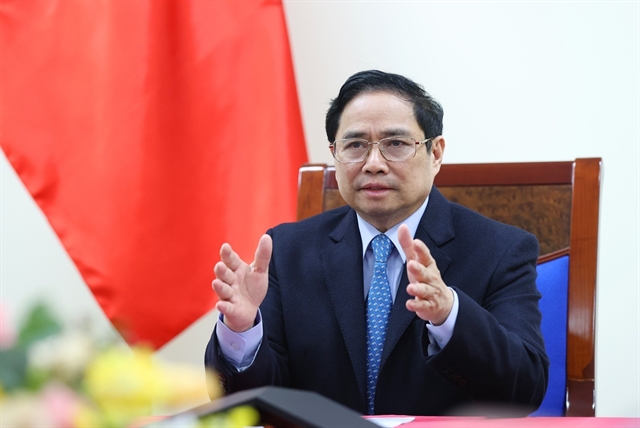Việt Nam, China discuss ties, border gate congestion
HÀ NỘI — Vietnamese Prime Minister Phạm Minh Chính had a phone call with the premier of the State Council of the People's Republic of China Li Keqiang on Thursday to discuss measures to boost relations and handle products stranded at border gates.

The talk was held for the 72th anniversary of the establishment of diplomatic ties between Việt Nam and China (January 18).
The two sides reviewed achievements of Việt Nam-China relations over the past year and discussed measures to strengthen friendship and enhance political trust as well as expand cooperation between the two countries.
PM Chính congratulated the Party, State and people of China for its achievements in pandemic prevention and control and socio-economic development.
He stressed that the development of the Việt Nam-China comprehensive strategic cooperative partnership was always the top priority in the foreign policy of independence, self-reliance, multilateralisation and diversification of Việt Nam; and the effective and sound development of bilateral relations had an important meaning in the stability and development of each country.
After 35 years of Đổi mới (Renewal), under the leadership of different generations of leaders of Việt Nam and under the current direction of Party General Secretary Nguyễn Phú Trọng, Việt Nam continues to build, supplement and complete theories about socialism and the path to socialism, PM Chính said.
Chinese Premier Li agreed the Vietnamese PM and congratulated him on achievements that the Party, State and people of Việt Nam gained in COVID-19 pandemic prevention and control and socio-economic recovery and development.
He noted that the Party, State and people of China attached great importance to the relations with Việt Nam and wished to strengthen the traditional friendship and continuously develop the China-Việt Nam comprehensive strategic cooperative partnership.
The two leaders agreed that the Việt Nam-China relations continued to develop and gained positive results in 2021. Exchanges of high-ranking delegations were maintained, including two phone calls between the two Party leaders. Two-way trade turnover is estimated to reach a record high of over US$160 billion in 2021, despite COVID-19.
Cooperation in pandemic prevention and control was a spotlight in relations between the two countries, particularly cooperation on vaccines. ASEAN-China cooperation also posted positive results.
The two sides have worked to deal with agricultural products being stranded at border gates. PM Chính said the two sides needed to coordinate closely and apply effective and drastic measures to continue handling the issue to ensure smooth trading activities to help maintain supply and production chains between the two countries and the region.
Chính proposed China continues expanding the import of goods and speed up opening of the market agricultural produce from Việt Nam.
Việt Nam implementing the motto “safety for exports and exports must ensure safety,” the Government leader said.
Chinese Premier Li said he attached importance to the proposals of Việt Nam about cooperation in economy, trade and investment, considering this an important field of cooperation.
Li directed ministries and localities of China to coordinate to deal with the congestion immediately after PM Chính sent a letter to him and met the Chinese Ambassador to Việt Nam.
The situation at the border gates has been handled and trading activities via border gates have been improved, he said.
He proposed the two sides to set up a joint task force to continue dealing with this issue, creating favourable conditions for Vietnamese agricultural produce to enter China and to help maintain smooth trading between both sides.
Chính suggested the two sides continue implementing three legal documents about the land border between Việt Nam and China; uphold negotiation mechanisms to maintain peace and stability in the East Sea (internationally known as South China Sea); respect legitimate and legal interests of each other in line with international laws and properly handle sea-related issues in line with the leaders of the two countries and the 1982 United Nations Convention on the Law of the Sea; and promote negotiations to build and complete the Code of Conduct (COC) in the East Sea.
The two leaders agreed to continue to maintain channels of exchanges about land border and sea-related issues.




